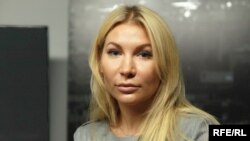Moscow authorities refuse to allow protest against sexual harassment
| Publisher | Radio Free Europe/Radio Liberty |
| Publication Date | 3 April 2018 |
| Cite as | Radio Free Europe/Radio Liberty, Moscow authorities refuse to allow protest against sexual harassment, 3 April 2018, available at: https://www.refworld.org/docid/5b20dda06c.html [accessed 1 June 2023] |
| Disclaimer | This is not a UNHCR publication. UNHCR is not responsible for, nor does it necessarily endorse, its content. Any views expressed are solely those of the author or publisher and do not necessarily reflect those of UNHCR, the United Nations or its Member States. |
April 03, 2018 10:19 GMT
By RFE/RL
 Social activist Alyona Popova (file photo)
Social activist Alyona Popova (file photo)
Moscow city authorities have denied activists permission to hold a protest against sexual harassment on a central square outside the Kremlin on April 3.
Activist Alyona Popova, said on April 2 that city authorities told organizers of the planned demonstration that it could not be held because another public event had already been scheduled on Manezh Square at around the same time.
It was not immediately clear whether activists would attempt to hold the rally without a permit.
The demonstration had initially been planned for March 29 but was postponed as Russians mourned the victims of a fire that killed 64 people at a shopping mall in the Siberian city of Kemerovo on March 25.
The rally was organized amid an outcry over sexual harassment following allegations focusing mainly on Leonid Slutsky, a senior lawmaker in the State Duma, Russia's lower parliament house.
Activists are seeking to channel anger, honor victims, and hold perpetrators of sexual harassment accountable for their actions.
Yekaterina Kotrikadze, a deputy editor with New-York-based RTVI television, Darya Zhuk, a producer with the independent Dozhd TV, and BBC Russian correspondent Farida Rustamova have accused Slutsky of making crude, unwanted advances toward them, including trying to kiss them and touching them inappropriately.
The Duma's ethics commission ruled on March 21 that Slutsky had not committed any violations of "behavioral norms," prompting more than 20 media outlets to pull their journalists from covering the lower house.
The ethics commission ruling and dismissive public comment by several lawmakers and officials has added to the ire of activists and others who are angry about the alleged actions by Slutsky and others in positions of power.
The allegations from the journalists came amid continuing public debate in the United States about sexual harassment following claims from several women in the film industry who say they were sexually harassed by Hollywood producer Harvey Weinstein.
In comments to students on March 29, President Vladimir Putin's spokesman, Dmitry Peskov, likened Weinstein's accusers to "prostitutes" and suggested that Slutsky's accusers should have spoken out earlier.
With reporting by RFE/RL's Russian Service, RIA, and Kommersant
Link to original story on RFE/RL website
